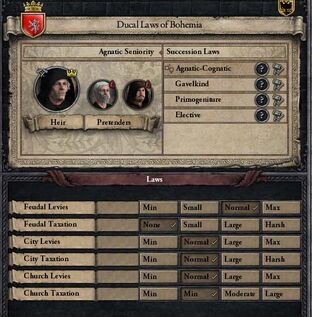
Law's interface
This article describes the holdings laws, but omits the succession laws. For in-depth article about succession laws, please go to: Succession Laws
The laws interface, besides changing succession laws, allows you to set local laws for your barons, bishops and mayors, or for your holdings. Each change of law will have vassal supporters of the change and opposers, negatively or positevly changing ther opinion of you. Based on the opposition to the change your law may fail to pass.
There are such categories of holdings laws:
______________________________________________________________________
feudal levies – This determines the percentage of your vassals’ levies
that have to be provided to their liege in times of war.
feudal taxation – This determines the tax rate your feudal vassals must
pay. Traditionally, this is little or none because of the levies they provide,
but other arrangements can, of course, be made.
city levies – This toggle sets the amount of troops your cities are obli-gated to provide in times of war.
city taxation – The cities are the golden geese of your realm, and here is
where you decide how much gold to squeeze from those geese.
church levies – This toggle determines the amount of troops that church
vassals are formally obligated to provide.
church taxation - Church vassals can provide you with a significant
tithe. How large that tithe is can be set here. Of course, if they like the
Pope or Patriarch more, that gold just might flow to their coffers instead.
________________________________________________________________________
It is important to remember that whether you are Count, Duke, King, or
Emperor, you are not an absolute monarch. There is a very important check
on your authority to set these laws, as your vassals get to vote. A majority must
approve the proposed change before it can take effect. The better ranks you have, the more votes you get. The highest of the nation (the king, grand-duke or emperor) often gets more than the lowest (barons, bishops, counts), but less than his highest vassals (dukes etc). For example, counts and barons get 1 vote, the king gets 4 votes and most of the dukes get 12 votes.